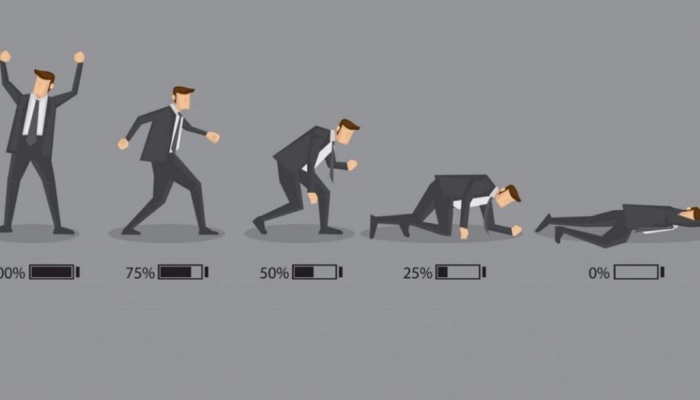While the thrill of a demanding job is often enough to keep us motivated at work, we don’t always have enough energy to get all of our tasks done to the level of satisfaction we’d like. Increased stress and pressure can even make us feel drained before we get to the office.
Managing your energy levels is essential not just for you to enjoy what you do but also to carry out your responsibilities towards clients and other colleagues, more so if you are in a leadership position. Your energy is what drives the rest of the team. For those who have family and others to take care of, it’s not just about having sufficient energy for the working hours.
A recent survey of 106 bank employees showed that 71% felt their energy levels had a significant impact on productivity and performance. Having more energy isn’t about working longer hours. It also shouldn’t be about lunch at your desk while you tick off a few other tasks. It’s about getting more done in the time you have.
Before discovering how to manage your energy at work, you first need to have some energy to manage.
There are many things you know you can do to improve your energy levels but with busy lives, they might get put on the back burner. These things include spending time in nature and fresh air, eating well, and getting enough sleep. Make these activities a daily priority. Other ways to start feeling more energetic include:
· Having time away from electronic devices
· Getting the right amount and type of exercise
· Spend time with people who are energetic rather than draining
· Practice meditation and mindfulness
· Dedicate some time to doing things you like
Energy is much like a battery, using it is going to drain it but it’s necessary to make sure you keep recharging it. Here are some ideas to manage your energy and stress at work.
#1. Get up from your desk
When you are mainly working at a desk, you risk leading a sedentary lifestyle, which can lead to mental and physical health problems, as well as a sluggish feeling. It’s generally recommended that you stand up and move around at least every 30 minutes. Setting a reminder will help. Think about the tasks you have and decide if they all require your desk. If you have phone calls, you could make these standing up or walking around. Many corporations are setting aside areas for standing desks so that employees aren’t constantly sitting down.
#2. Be strict about taking breaks
Generally speaking, adults can concentrate for 90 minutes before needing a break. Working non-stop might make you feel like you are getting more done, but with a lack of focus, it takes longer to complete tasks. Set a 5-minute break for every 90 minutes you work and be just as strict with yourself when it comes to getting back to work.
#3. Take advantage of your ultradian rhythms
Ultradian rhythms are the natural cycles we have of high and low energy. There is a close link with our concentration because most cycles are between 90 and 120 minutes. Make a note of the moments you feel you have more energy and times where you feel flat. Take advantage of these cycles and plan those activities that require more energy for when you know your ultradian rhythms are in your favor.
#4. Stop forcing yourself during the slumps
We have all been there. Those moments when you only need 10 or 15 minutes to finish a job but it feels like you don’t even have enough energy to pick up a pen. Forcing yourself in these times is like driving a car when the gas light is on. Step away, move around, grab some water. Put some gas back in the car before it’s too late and it breaks down.
#5. Stop multi-tasking so much
Doing numerous things at the same time requires more energy than focusing on one thing and doing it right. The more things you attempt to do at once, the more your attention is spread. It’s more likely that mistakes are made, and you will have to use up extra energy to fix them.
#6. Boost your confidence
Studies show the link between higher energy levels and greater confidence. Scientists haven’t pinpointed which causes the other, but you will find that if you work on tasks that improve your confidence, you will feel energized.
#7. Plan for balance
Whether it’s mental or tangible, most people will create a to-do list for their day. How you organize this list can play a role in your energy levels. It’s normal to prioritize your lists, especially if you have deadlines. Whenever possible, try to create some balance in your day. Mix tasks up so that you have some longer tasks followed by a few short ones or some fun jobs in between those that are more challenging.
#8. Make the most of quiet times
Despite not needing high amounts of energy, boredom doesn’t help us manage our energy. Rather than sharpening your pencils and unnecessarily shuffling papers, use these quiet times to brush up on your skill or learn something new. If you are responsible for a team, go and spend some time with them and find out how they are getting on with their energy levels!
If you want a job on the Islands, visit our jobs portal to see the latest vacancies.
Are you hiring? Book a Discovery Call if you’re hiring and see how we can help.
Actuarial | Audit & Advisory | Corporate Services | Finance | Insolvency & Restructuring | Legal | Regulatory & Compliance | Trusts | US Tax





![Enjoy All Your Bermuda Days [Video]](https://www.hamilton-recruitment.com/wp-content/uploads/2022/06/Parade-700x400-1-500x383.jpg)
![Bermuda Careers for Actuaries [Video]](https://www.hamilton-recruitment.com/wp-content/uploads/2022/03/Video-Actuaries-700x400-1-500x383.jpg)
Leave A Comment
You must be logged in to post a comment.